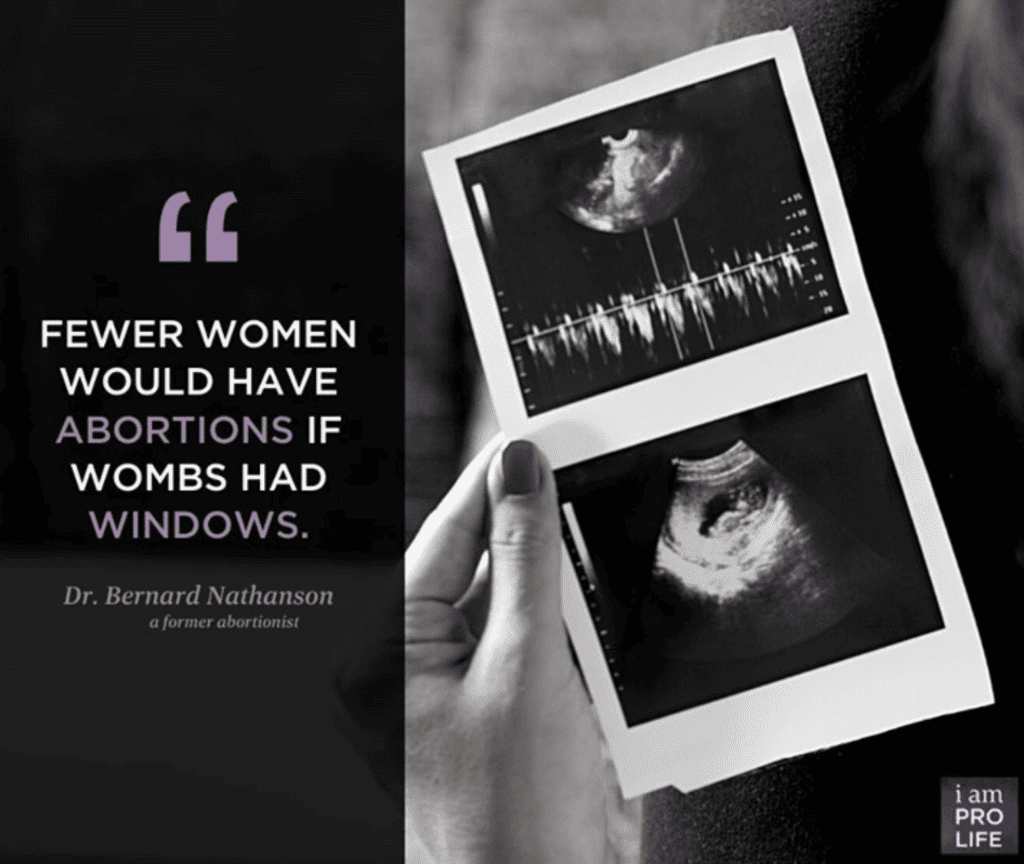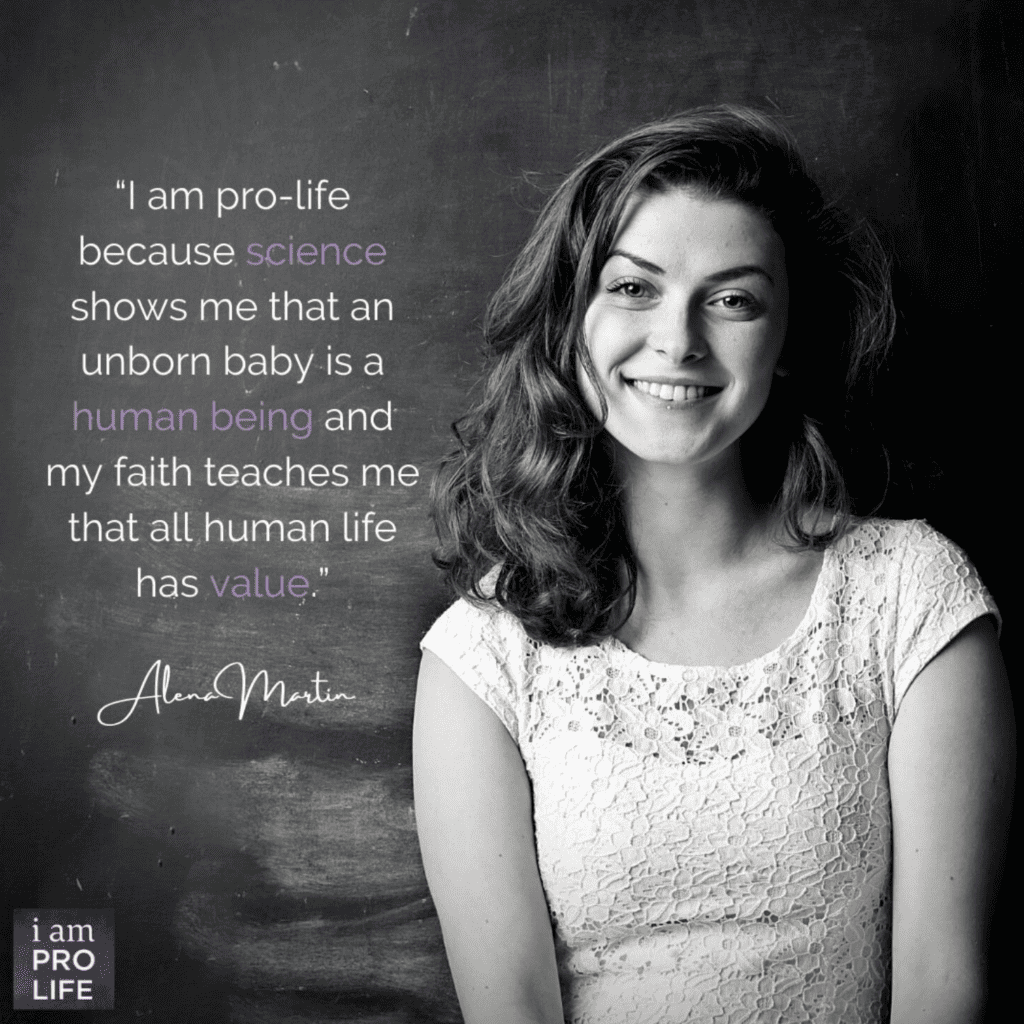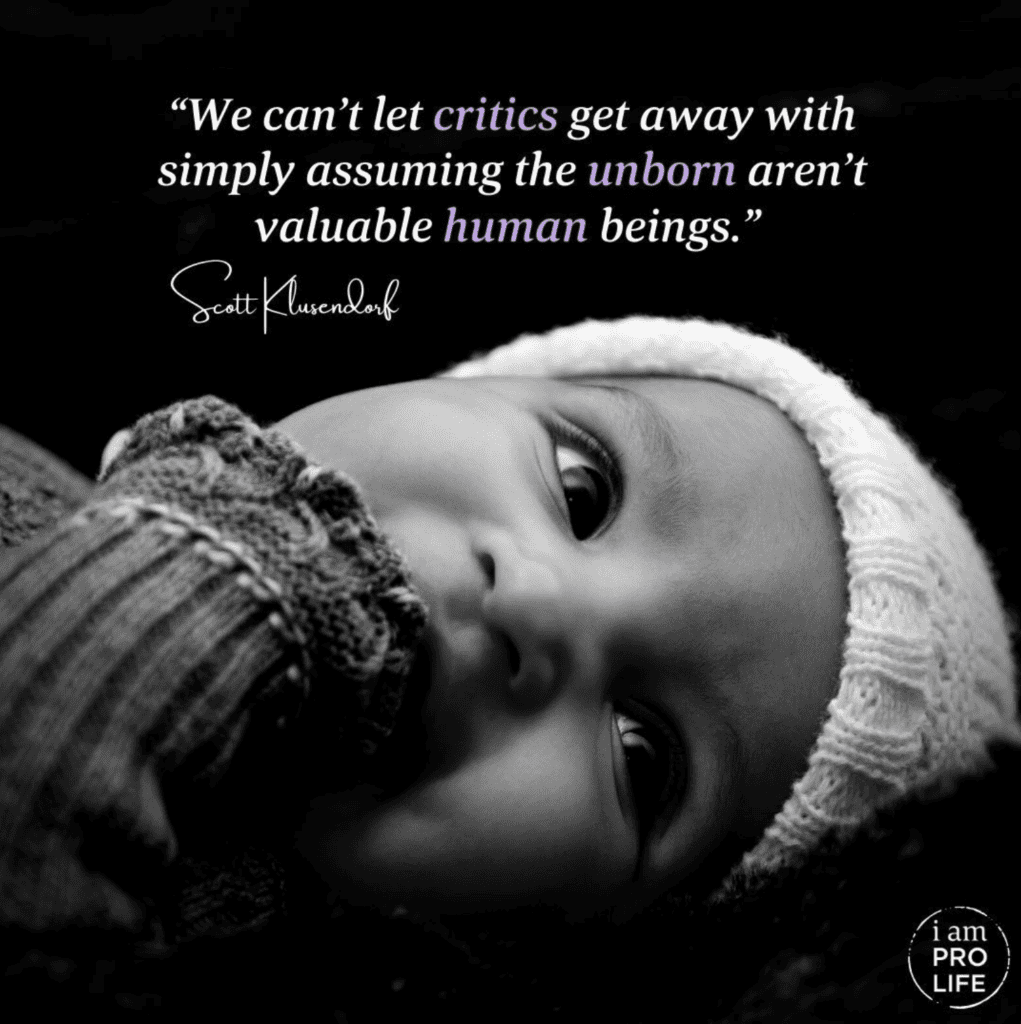Abortion has always been a contentious issue. We encounter and engage people with a variety of deeply held beliefs. Every Christian needs to understand fundamental pro-life arguments and be ready to speak truth with love.
We can passionately argue against abortion while treating people with love and respect. And we must. Regardless of a person’s actions, choices, or beliefs, we are not against them. Rather, we are against abortion.
Winning hearts for Christ is infinitely more important than “winning” an argument. In any situation, as we argue for life and against abortion, this is our foundation: We are pro-life and pro-love.
The pro-choice arguments we encounter often revolve around women’s “constitutional right to abortion.” Most on the pro-life side need to better understand why abortion is not a constitutional right before we can address this argument effectively. We’ll unpack this in Part 2 of Pro-Life Arguments Explained.
The heart of the issue isn’t the law. The reality of human life – when does it start, why does it matter – is what determines the interpretation of our legal rights.

Pro-life arguments stand firm on the biology of the human life cycle. Science focuses on objective information, not religious, political, philosophical, or personal beliefs. For this reason, many of the pro-choice people you engage with may not share your faith or biblical worldview. So, start with the facts.
A scientific survey of Americans asked who they believe is most qualified to decide when human life begins. Of five choices – biologists, philosophers, religious leaders, Supreme Court Justices, and voters – 80% of participants viewed biologists as the best authority to determine when life begins.
Subsequently, more than 5,000 biologists from academic institutions worldwide were surveyed to answer this question. 96% of biologists affirmed that human life begins at fertilization.
This is a compelling fact for pro-life arguments. The point at which human cells become a human being is central to the abortion debate. The biological truth is clear.
When an egg and sperm cell join, the two become one. It’s called a zygote, a single cell with a unique genetic code. Scientists definitively classify organisms by their DNA. A biologist asked to identify an unknown zygote would turn to genetics. That single cell has the same DNA as the adult organism – is this zygote Homo Sapiens or Pteromys Volans?
Pteromys Volans happens to be a Siberian flying squirrel. How could a biologist determine a specimen’s exact species? That’s right: DNA.
Related Article: Science vs. Bible: When Does Life Begin?
Upon conception, a Homo sapiens zygote exists. But is it a person? Are all people equally valuable?
Every human being is precious to God. Jesus made that clear on the cross! Every person is an image-bearer of God Himself – even before birth. As Psalm 139:13-14 explains (NLT):
13 You made all the delicate, inner parts of my body
and knit me together in my mother’s womb.
14 Thank you for making me so wonderfully complex!
Your workmanship is marvelous—how well I know it.

A biblical exposition on the value of human life would take far more space than we have here. Pro-life arguments are typically more persuasive if they don’t stand on religious morality. Many pro-choicers disregard faith-based arguments against abortion.
We can reframe the moral question with a hypothetical scenario. Suppose an omniscient philosopher presents a man with two zygotes: one Homo sapiens, one unidentified. This man must choose which one will live. He thinks, “The world’s already overpopulated… a single cell can’t feel pain… let’s see what the other one turns out to be.” It’s decided.
The philosopher then reveals the human zygote would have grown into a woman who became a medical researcher and discovered a cure for cancer. The woman’s life would’ve saved countless people from terrible suffering, grief and death!
Does that change the equation? Is the human zygote now more worthy of life? This fantastical scenario illustrates the pro-life saying:
We all know it doesn’t take extraordinary accomplishments for a person’s life to matter. Generally, people instinctively know that preserving life is right and taking life is wrong.
If murder laws were repealed, would most people suddenly decide it’s acceptable to take the life of any person they choose? Of course not!
We have a human conscience that guides our morality. I would argue the basis for conscience is objective truth, which requires a source of objective truth – i.e., God. Without conscience, human existence devolves into Lord of the Flies.
There’s no definitive “good” or “evil” without objective truth – people live to dominate or be dominated. The value of each person is subjective, determined by those in power. Their calculus is self-interest, i.e., “Does this person enhance or detract from my enjoyment of life?”
Fortunately, that is not our reality. People generally believe that compelling justification is needed to take a life with moral impunity. The reasoning may be circumstantial (e.g., self-defense), or it may hinge on the other person’s state of being, as it does for abortion and euthanasia. Many justify these practices based on a person’s degree of development, decline or infringement on other people’s rights. But this is a dangerous slippery slope.
If the assessment is up to society, the results may preserve life or promote death. Consider the unintended consequences of China’s 35-year One Child policy. The socio-economic factors of Chinese culture have historically made male children more desirable than females. Many couples decided their child must be a son to preserve the family.
Once technology allowed parents to learn the sex of a preborn child, tens of millions of girls were aborted. This horrific tragedy created a massive gender imbalance. As of 2021, there are approximately 35 million more Chinese men than women. And this societal crisis adversely affects more than 1 billion people.

Ironically, many pro-choice advocates oppose selective abortion while supporting elective abortion.
In a 2014 press release, a prominent abortion provider decried the proposed “Abortion Non-Discrimination Act.” Although the bill was intended to prevent selective abortion (based on gender, race, etc.), they declared it a veiled threat to reproductive rights. The same release unequivocally stated: We oppose sex selection abortion.
So… it’s wrong to take a life based on sex or race… but acceptable if the mother’s reason is… anything else? This is logically untenable!
One cannot advocate for unrestricted abortion access while morally condemning sex-selective abortion.
Our human way of life, underpinned by common morality, testifies that every person has inherent value. We must hold this to be true from conception to natural death. If not, we create “gray areas” that invite unethical abuse of the most vulnerable among us.
We’ll explore this further when examining the legal aspects of “choice” in Part 2 of Pro-Life Arguments Explained.
The post Pro-Life Arguments Explained – Part 1 appeared first on Focus on the Family.
Continue reading...
We can passionately argue against abortion while treating people with love and respect. And we must. Regardless of a person’s actions, choices, or beliefs, we are not against them. Rather, we are against abortion.
Winning hearts for Christ is infinitely more important than “winning” an argument. In any situation, as we argue for life and against abortion, this is our foundation: We are pro-life and pro-love.
What Are the Top Pro-Life Arguments?
The pro-choice arguments we encounter often revolve around women’s “constitutional right to abortion.” Most on the pro-life side need to better understand why abortion is not a constitutional right before we can address this argument effectively. We’ll unpack this in Part 2 of Pro-Life Arguments Explained.
The heart of the issue isn’t the law. The reality of human life – when does it start, why does it matter – is what determines the interpretation of our legal rights.

The Science is Certain: Human Life Begins at Conception
Pro-life arguments stand firm on the biology of the human life cycle. Science focuses on objective information, not religious, political, philosophical, or personal beliefs. For this reason, many of the pro-choice people you engage with may not share your faith or biblical worldview. So, start with the facts.
A scientific survey of Americans asked who they believe is most qualified to decide when human life begins. Of five choices – biologists, philosophers, religious leaders, Supreme Court Justices, and voters – 80% of participants viewed biologists as the best authority to determine when life begins.
Subsequently, more than 5,000 biologists from academic institutions worldwide were surveyed to answer this question. 96% of biologists affirmed that human life begins at fertilization.
This is a compelling fact for pro-life arguments. The point at which human cells become a human being is central to the abortion debate. The biological truth is clear.
When an egg and sperm cell join, the two become one. It’s called a zygote, a single cell with a unique genetic code. Scientists definitively classify organisms by their DNA. A biologist asked to identify an unknown zygote would turn to genetics. That single cell has the same DNA as the adult organism – is this zygote Homo Sapiens or Pteromys Volans?
Pteromys Volans happens to be a Siberian flying squirrel. How could a biologist determine a specimen’s exact species? That’s right: DNA.
Related Article: Science vs. Bible: When Does Life Begin?
The Moral Imperative: Human Life Has Innate Value
Upon conception, a Homo sapiens zygote exists. But is it a person? Are all people equally valuable?
Every human being is precious to God. Jesus made that clear on the cross! Every person is an image-bearer of God Himself – even before birth. As Psalm 139:13-14 explains (NLT):
13 You made all the delicate, inner parts of my body
and knit me together in my mother’s womb.
14 Thank you for making me so wonderfully complex!
Your workmanship is marvelous—how well I know it.

Pro-Life Arguments and Christian Beliefs
A biblical exposition on the value of human life would take far more space than we have here. Pro-life arguments are typically more persuasive if they don’t stand on religious morality. Many pro-choicers disregard faith-based arguments against abortion.
We can reframe the moral question with a hypothetical scenario. Suppose an omniscient philosopher presents a man with two zygotes: one Homo sapiens, one unidentified. This man must choose which one will live. He thinks, “The world’s already overpopulated… a single cell can’t feel pain… let’s see what the other one turns out to be.” It’s decided.
The philosopher then reveals the human zygote would have grown into a woman who became a medical researcher and discovered a cure for cancer. The woman’s life would’ve saved countless people from terrible suffering, grief and death!
Does that change the equation? Is the human zygote now more worthy of life? This fantastical scenario illustrates the pro-life saying:
Each unborn life isn't a potential person – it's a person with potential.
We all know it doesn’t take extraordinary accomplishments for a person’s life to matter. Generally, people instinctively know that preserving life is right and taking life is wrong.
If murder laws were repealed, would most people suddenly decide it’s acceptable to take the life of any person they choose? Of course not!
Objective truth is a slippery slope.
We have a human conscience that guides our morality. I would argue the basis for conscience is objective truth, which requires a source of objective truth – i.e., God. Without conscience, human existence devolves into Lord of the Flies.
There’s no definitive “good” or “evil” without objective truth – people live to dominate or be dominated. The value of each person is subjective, determined by those in power. Their calculus is self-interest, i.e., “Does this person enhance or detract from my enjoyment of life?”
Fortunately, that is not our reality. People generally believe that compelling justification is needed to take a life with moral impunity. The reasoning may be circumstantial (e.g., self-defense), or it may hinge on the other person’s state of being, as it does for abortion and euthanasia. Many justify these practices based on a person’s degree of development, decline or infringement on other people’s rights. But this is a dangerous slippery slope.
Who can rightly assess a person's worthiness to live? By what criteria?
If the assessment is up to society, the results may preserve life or promote death. Consider the unintended consequences of China’s 35-year One Child policy. The socio-economic factors of Chinese culture have historically made male children more desirable than females. Many couples decided their child must be a son to preserve the family.
Once technology allowed parents to learn the sex of a preborn child, tens of millions of girls were aborted. This horrific tragedy created a massive gender imbalance. As of 2021, there are approximately 35 million more Chinese men than women. And this societal crisis adversely affects more than 1 billion people.

Selective and Elective Abortion
Ironically, many pro-choice advocates oppose selective abortion while supporting elective abortion.
In a 2014 press release, a prominent abortion provider decried the proposed “Abortion Non-Discrimination Act.” Although the bill was intended to prevent selective abortion (based on gender, race, etc.), they declared it a veiled threat to reproductive rights. The same release unequivocally stated: We oppose sex selection abortion.
So… it’s wrong to take a life based on sex or race… but acceptable if the mother’s reason is… anything else? This is logically untenable!
The Pro-Choice Argument Can't Be Both
One cannot advocate for unrestricted abortion access while morally condemning sex-selective abortion.
Our human way of life, underpinned by common morality, testifies that every person has inherent value. We must hold this to be true from conception to natural death. If not, we create “gray areas” that invite unethical abuse of the most vulnerable among us.
We’ll explore this further when examining the legal aspects of “choice” in Part 2 of Pro-Life Arguments Explained.
Related Videos:
- See Life Episode 1: The Truth About Life
- Level of Development ≠ Equal Personhood
- How a Former Abortion Doctor Became Pro-Life
The post Pro-Life Arguments Explained – Part 1 appeared first on Focus on the Family.
Continue reading...





